【報告】ボルトロッティ連続講演会(+ボルトロッティさんからの手紙)
2010年10月23日から29日まで,バーミンガム大学(イギリス)のリサ・ボルトロッティさん(Dr. Lisa Bortolotti)の連続講演会(計5回)をおこないました.
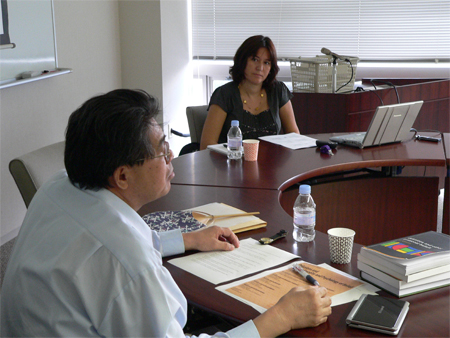
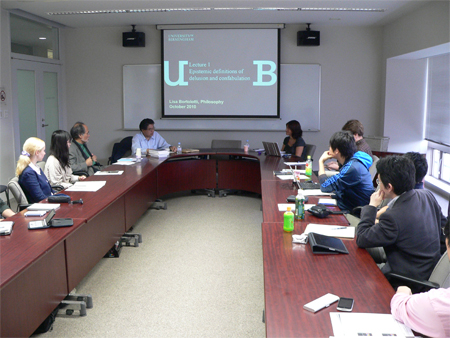
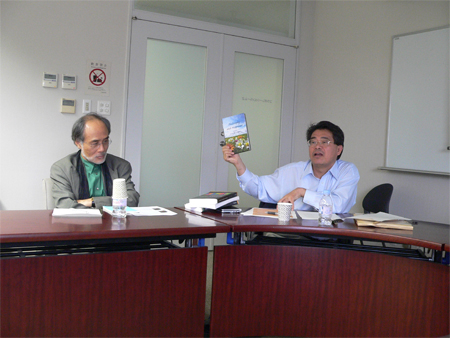
ボルトロッティさん(⇒ こちらのウェブサイトもご覧ください)は精神病理の哲学や心の哲学が専門.今回の連続講演会のタイトルは「Delusions and the Philosophy and Psychology of Belief」です.妄想は信念なのか,ということを論じたDelusions and Other Irrational Beliefs (Bortolotti, L. 2009. Oxford University Press).を基本としつつ,さらにそこから発展させた研究成果をボルトロッティさんは論じました.
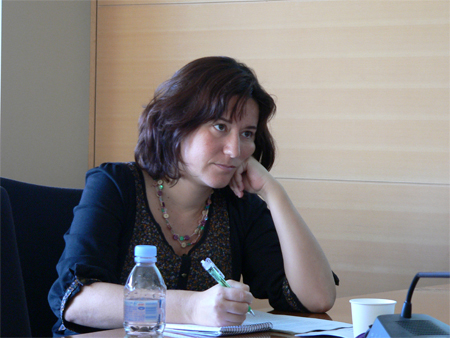
ボルトロッティさんの著書を読んでも分かることですが,ボルトロッティさんの議論はとても明快です.また,これも著書と同じで,とても丁寧に議論します.私たちは5回の講義各回に特定質問者を決めて,各自が短いプレゼンテーションをおこないました.こうした私たちのプレゼンテーションにもとても丁寧に応答していただき,私は非常に感銘を受けました.
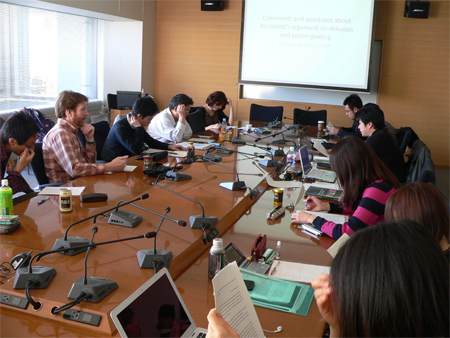
第2回目のレクチャーでプレゼンテーションを行った筒井晴香さんと第5回目のレクチャーでプレゼンテーションを行った西堤優さんからボルトロッティさん講演会の感想を送ってもらったので,紹介しようと思います.
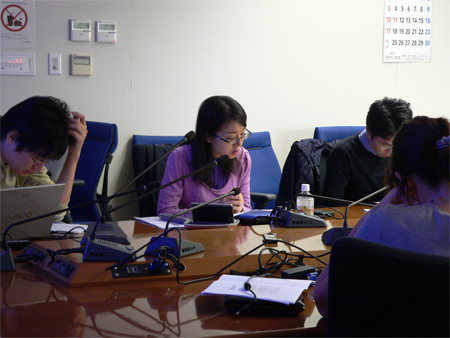
☆☆☆☆☆筒井晴香(東京大学)☆☆☆☆☆
ボルトロッティさんの第二講義「妄想はいかなる意味において非合理的か」においては、病理的な妄想、そして我々が日常的に抱く信念の持つ非合理性がテーマとなった。
ボルトロッティさんによれば、妄想は以下の二点において非合理的である。
◆適切な経験的証拠を欠く。あるいは、それを覆すような証拠が新たに手に入っても改訂されない。…認識的非合理性
◆他の諸信念と適切に統合されていない。…手続き的非合理性
だが実のところ、この種の非合理性は、我々が日常的に抱く非妄想的な信念においても頻繁に見られる。非合理性という点では、妄想と日常的信念の違いは程度差に過ぎない。
ボルトロッティさんは妄想に関する伝統的見解に抗して、妄想と日常的信念との間の連続性を強く主張する。前者を非合理的・後者を合理的と見るのでなく、いずれも程度差はあれ非合理的なものと特徴づけるのである。
しかし、両者の連続性は、むしろ両者を合理的なものと見る形で捉えるべきであるようにも思われる。妄想も日常的信念も、完全な認識的・手続き的合理性を備えてこそいないが、意味を理解することは概ね可能であるといえる。デイヴィドソンやデネットといった解釈主義の観点からすれば、理解可能性は即ち合理性に等しい。特定質問においては、この点に関してボルトロッティさんにコメントを求めた。
ボルトロッティさんが解釈主義的見解を取らないのはなぜか。彼女によれば、デイヴィドソンやデネットの論述における合理性概念は実際のところ曖昧であり、理解可能性という弱い意味と、原則に則った推論・判断という強い意味との間を揺れ動いている。彼女が適切な合理性概念として採用するのは後者である。理解可能性概念は、合理性概念として見るには弱過ぎる。信念の理解は多種多様な経験的一般化を通して達成されるものであり、「合理的」と言えるような推論を経て得られるものではないとボルトロッティさんは考えているのである。
☆☆☆☆☆
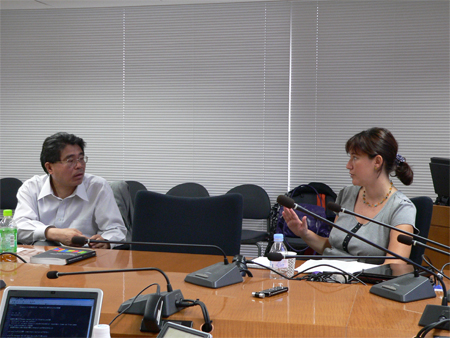
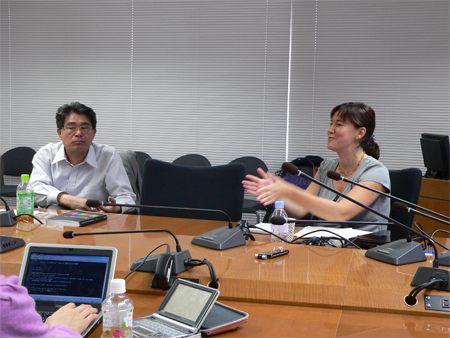
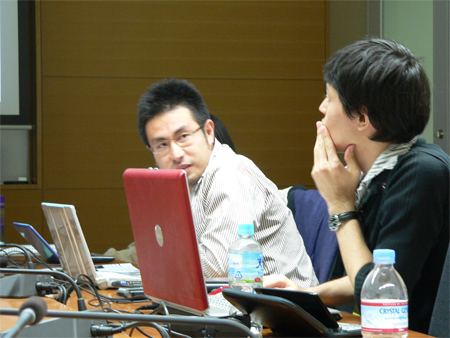
☆☆☆☆☆西堤優(東京大学)☆☆☆☆☆
第5回目のレクチャーは「Delusions and Self-governance」である。その中でボルトロッティさんは、統合失調症のような幻覚や妄想を伴う精神疾患患者の責任帰属の問題について考察を行った。ボルトロッティさんは、統合失調症者が罪を犯した場合、健常者よりもその罪に対する責任を軽減することが可能であると結論付けている。その理由は、彼らが幻覚や妄想を伴っていたからではない。彼らには、道徳的または法的に許容可能な振舞いを実現させる意思決定上の機能不全があったためである。彼女の考察は大変興味深いものであり、精神疾患を伴う者への責任帰属という現実的な問題を考える上で参考になるように思われた。
また、ボルトロッティさんは、Delusion and Other Irrational Beliefsの第五章で取り上げているように、信念に対して理由付けをすることが自己知に貢献するのかどうかという問題について非常に興味深い考察を加えた。それによると、理由付けされた信念を受け入れるということは、結果的に信念の体系化をもたらし、そのような体系によってもたらされる自己知は、そのような体系なしでもたらされる自己知よりも堅固なものになる。それゆえ、ある信念に理由付けをすることは自己知に貢献するのである。ボルトロッティさんの議論は明快であり、この回も他の回と同様に活発な質疑応答がなされ、提題者にとってもすべての参加者にとっても大変有意義なものになったように思われる。最後にこの場を借りてボルトロッティさんとこのレクチャーの場に携わってくださったすべての人々にお礼申し上げたい次第である。
☆☆☆☆☆
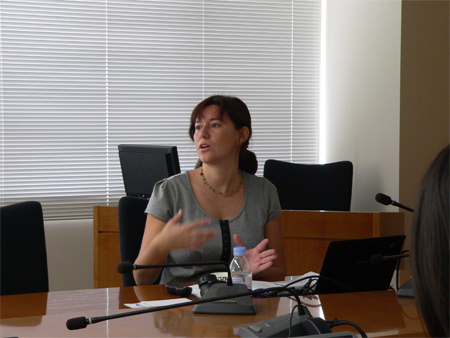
講演会がおわって一週間ほどたち,イギリスに戻ったボルトロッティさんに今回の連続講演会の感想をこのUTCPブログに寄稿をしてもらいました.
【ボルトロッティさんから】
When I received an email from Professor Nobuhara inviting me to deliver a series of lectures at UTCP, I was delighted, because I knew that the Centre promoted the type of “applied philosophy” I like (e.g., empirically informed philosophy of mind and neuroethics), and because I treasured the opportunity to spend some time in one of my favourite cities in the whole world. In Tokyo, I soon realised, just after the first lecture, that this would be a fantastic experience from both an academic and personal point of view.
The series of lectures was entitled “Delusions and The Philosophy and Psychology of Belief”. In each of the first three meetings I presented an argument that I developed in the monograph on delusions I published in 2009 (“Delusions and Other Irrational Beliefs”, OUP) and some implications to be drawn from it. In the last two lectures I presented more recently developed arguments, about the relationship between delusions and action, and about whether people with delusions can be held responsible for the actions that are motivated by their delusions. After one hour and a bit of me talking, one or two detailed commentaries followed. I was then given a chance to respond, and a QA session took place.
It is always a pleasure to see people interested in your work, but the bright graduate students and post-doctoral researchers at UTCP exceeded my expectations. They were very knowledgeable about the topic (philosophical accounts of delusions and implications for beliefs) and provided very helpful feedback in the form of commentaries and questions. What struck me about all the commentaries, which ranged from the psychology of belief to the nature of moral responsibility, is that they were original. The authors didn’t just make comments and objections to my arguments, but put forward novel solutions to serious philosophical problems – and it was even more impressive because they only had 15 minutes to do so! They also raised questions emerging from examples I had never considered before, forcing me to think hard on the spot. As a result of this productive exchange, I started reconsidering many issues that I had set aside after completing my project on delusions, I was inspired to write about further potential implications of my view, and to clarify my position where it had been so effectively challenged.
UTCP philosophers were also incredibly friendly and hospitable, taking me to dinner in very exciting places which would have been difficult for me to visit on my own due to my total incompetence in the Japanese language (something I hope to remedy in the future). I loved the range of seasonal dishes I had the fortune to taste (among which oden and soba), and, above all, the wonderful company. Philosophical issues crept in the conversation, predictably, but we also talked about many other things, and I feel I got really close to some of the people I met. (I was also helpfully advised about what to do in my spare time in Tokyo, and warned about a looming typhoon, which was very considerate of my hosts, as I had been ignoring the news since my arrival in Tokyo, too absorbed in an intensive programme of philosophy and good food).
I found myself envying the students working at UTCP, under the leadership and care of Professor Nobuhara. They looked like a tight group, as they were cooperative and helpful to each other, and clearly had the competence, motivation, and energy to contribute substantially to the advancement of “applied philosophy” and to the profession in general. I hope to meet them again all very soon, and I am grateful to Professor Nobuhara for the opportunity to be part of the Centre for ten days or so, and to Mr Nakazawa for organising my stay and my lectures so impeccably. I have been back only a few days, and I miss UTCP already!
(Lisa Bortolotti)
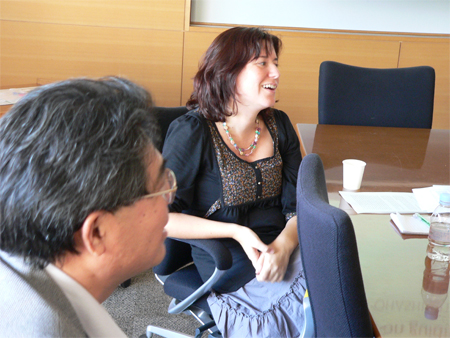
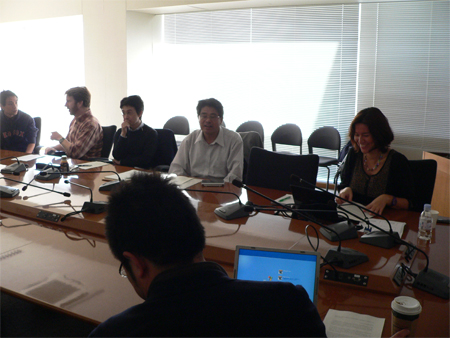
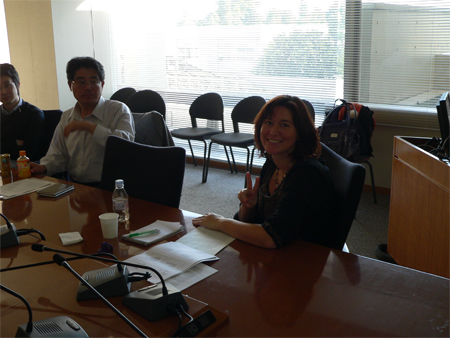
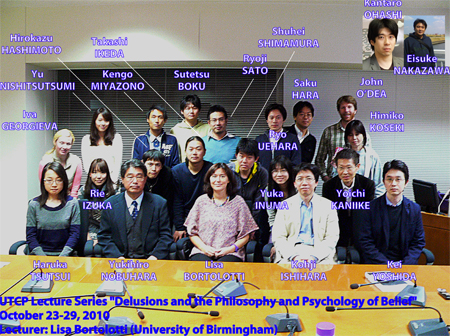
中澤栄輔(PD研究員)






